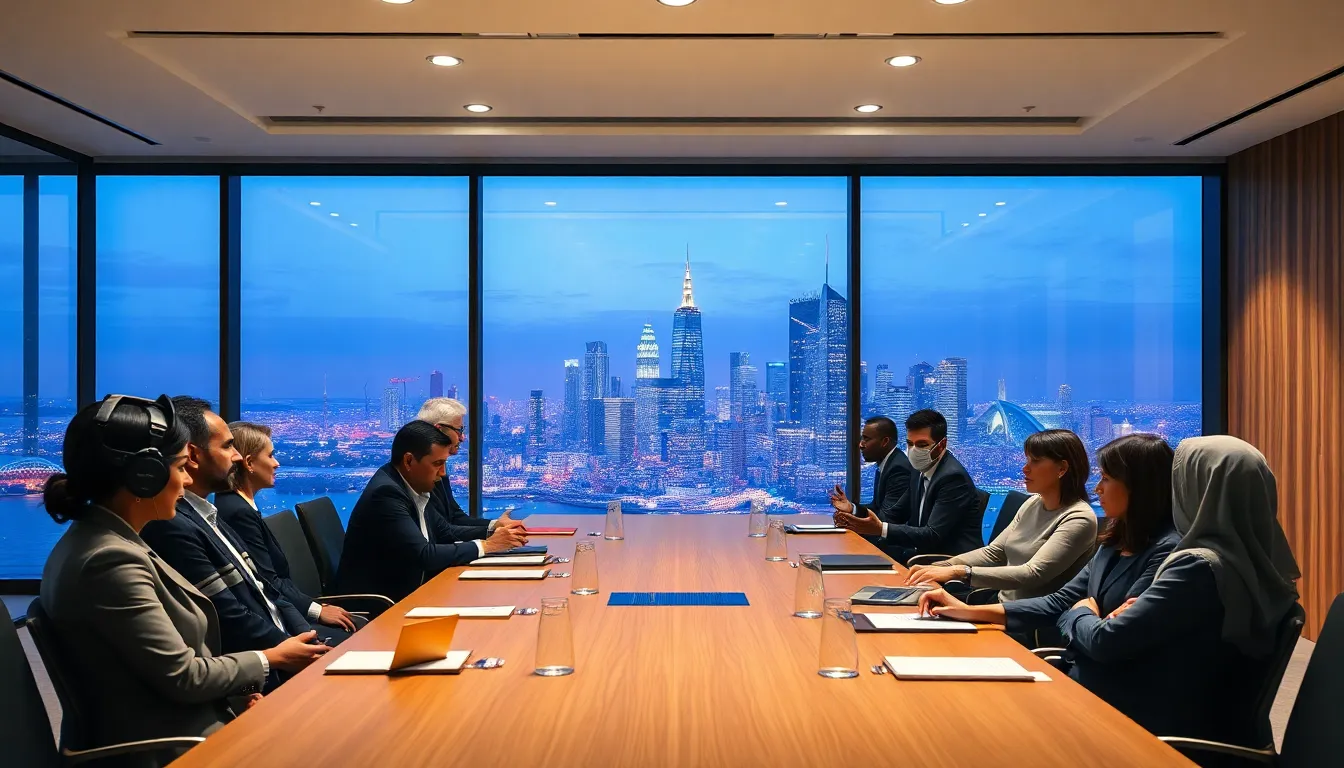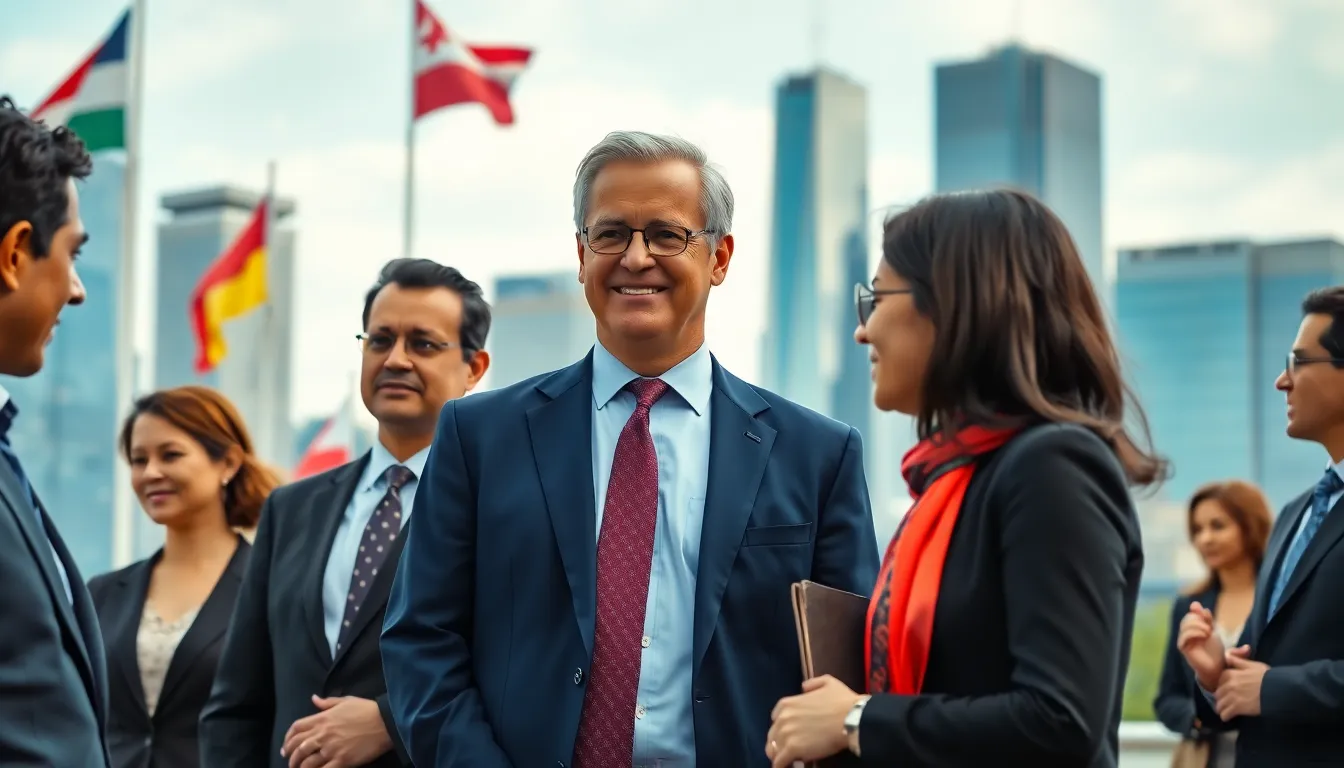In a world where cities are flexing their muscles like never before, city-state diplomacy has become the new black. Forget the old-school nation-states; these urban powerhouses are forming alliances, negotiating trade deals, and even throwing in a cheeky cultural exchange or two. Who knew that a city could be as influential as a country?
Table of Contents
ToggleDefinition Of City State Diplomacy
City-state diplomacy refers to the activities undertaken by urban centers that function similarly to sovereign entities. It encompasses various interactions between cities and nation-states, focusing on trade, culture, and political negotiations. These urban centers often establish formal relationships with foreign governments, aiming to promote economic growth and cultural exchange.
Urban areas engage in strategic partnerships with one another, facilitating information sharing and collaborative efforts. Examples include cities forming alliances to tackle shared issues such as climate change and public health. Such interactions emphasize a city’s increasing power in global affairs, demonstrating their capacity to influence international policies directly.
Trade agreements serve as a primary avenue for city-state diplomacy, allowing cities to enhance their economic positions. These agreements often focus on sectors like technology, renewable energy, and tourism, illustrating how cities capitalize on their unique strengths. Cultural initiatives also play a crucial role, with cities promoting arts, heritage, and education to foster mutual understanding and goodwill.
The rise of city-state diplomacy indicates a shift in traditional diplomatic practices, where cities assert their significance on the world stage. An example includes Singapore’s proactive engagement in international trade and environmental sustainability discussions, positioning itself as a key player among global cities. As urban areas continue to embrace this diplomatic approach, they redefine power dynamics, asserting their relevance in international relations.
Historical Context

City-state diplomacy has roots in various historical contexts, showcasing how urban centers have long engaged in interactions resembling those of sovereign nations.
Ancient City States
Ancient city-states like Athens, Sparta, and Carthage demonstrated early forms of city-state diplomacy. These entities negotiated treaties, formed military alliances, and engaged in trade, influencing regional power dynamics. Athens, for example, established the Delian League to protect and promote collective interests among Greek city-states. Such arrangements allowed these cities to build networks that bolstered their political and economic stature. Additionally, cultural interactions, including festivals and athletic competitions, strengthened ties among these city-states.
Modern Examples
Contemporary city-states like Singapore, Monaco, and Hong Kong embody the principles of modern city-state diplomacy. Singapore focuses on international trade agreements, driving its economy through strategic partnerships with other nations. These alliances often address global challenges, such as climate change and public health, reflecting a proactive diplomatic stance. Likewise, Monaco engages in cultural exchanges and tourism initiatives that enhance its global presence. Hong Kong, despite geopolitical tensions, maintains significant economic and cultural ties with cities worldwide, showcasing resilience in its diplomatic efforts.
Key Characteristics Of City State Diplomacy
City-state diplomacy exhibits distinct traits that set it apart from traditional state diplomacy. Key aspects include autonomy and independence, as well as economic influence.
Autonomy And Independence
Autonomy marks a vital characteristic of city-state diplomacy. Urban centers operate with a degree of sovereignty, often engaging independently with other nations. Collectively, they make decisions that reflect local interests rather than national agendas. Many city-states establish their own foreign policies, allowing for tailored approaches in diplomacy. Singapore exemplifies this, maintaining significant control over its international relations. Independence empowers cities to form strategic partnerships, especially in areas like trade and cultural exchange. Leaders in these cities can prioritize immediate community needs, showcasing their unique voices on the global stage.
Economic Influence
Economic clout stands as another hallmark of city-state diplomacy. Urban centers leverage their financial resources to negotiate favorable trade agreements and attract investment. Many city-states act as global economic players, influencing sectors such as technology and renewable energy. Hong Kong, for instance, serves as a major financial hub, impacting regional economies through its trade policies. Their economic strategies also include promoting innovation and sustainability, aligning with global market trends. By capitalizing on their strengths, these cities enhance their competitive positions, contributing to both local and international economic dynamics.
Case Studies In City State Diplomacy
City-state diplomacy manifests in diverse contexts, showcasing unique approaches among urban centers. Two notable examples include Singapore and Vatican City.
Singapore
Singapore stands out for its proactive engagement in global trade. The city-state has forged over 100 free trade agreements with various nations, enhancing its economic competitiveness. It actively seeks collaborations in technology and renewable energy, aiming for sustainable development. Further, Singapore plays a crucial role as a financial hub, attracting international businesses and investments. Diplomatic missions in multiple countries foster strong international ties, reaffirming its status as a significant player on the world stage.
Vatican City
Vatican City exemplifies diplomatic influence through cultural and religious channels. The Holy See conducts diplomatic relations with over 180 states, promoting peace and humanitarian efforts globally. It organizes interfaith dialogues that emphasize cooperation and mutual understanding among different religions. Through initiatives, Vatican City addresses global issues like climate change and poverty, leveraging its moral authority. This small city-state effectively uses its unique position to influence international policies and foster connections beyond its borders.
Challenges Faced By City States
City-states encounter unique challenges that impact their diplomatic efforts. Limited resources often hinder their ability to compete on a global scale. Autonomy may lead to conflicts with larger nations that pursue a more centralized diplomatic agenda.
Security concerns arise when navigating complex geopolitical landscapes. Tensions between neighboring countries can affect trade routes and cultural exchanges. Environmental issues pose additional challenges, as city-states often face greater risks from climate change due to their geographic locations.
Negotiating trade agreements proves difficult when balancing local development with international obligations. Maintaining partnerships requires consistent diplomacy, which can strain resources. Public health crises, such as pandemics, disrupt not only local economies but also international relations.
Competition for foreign investment intensifies amidst numerous city-states vying for the same opportunities. They must continually innovate to attract businesses while ensuring sustainable growth. Addressing disparities in wealth and resources becomes essential for fostering stability within city-state populations.
Intangible cultural diplomacy also requires attention, as city-states aim to project soft power through cultural initiatives. Urban centers must carefully craft their narratives in order to enhance their global profiles. Ultimately, city-states face the challenge of balancing local interests with the demands of a rapidly changing international landscape.
City-state diplomacy represents a transformative shift in how urban centers engage with the world. As cities navigate their unique challenges and opportunities, they continue to assert their influence on global affairs. By forming strategic partnerships and focusing on trade and cultural initiatives, these urban entities redefine traditional diplomatic practices. The dynamic interplay between local interests and international obligations will shape the future of city-state diplomacy. As cities like Singapore and Vatican City illustrate, the ability to adapt and innovate will be crucial for maintaining relevance in an ever-evolving geopolitical landscape.



